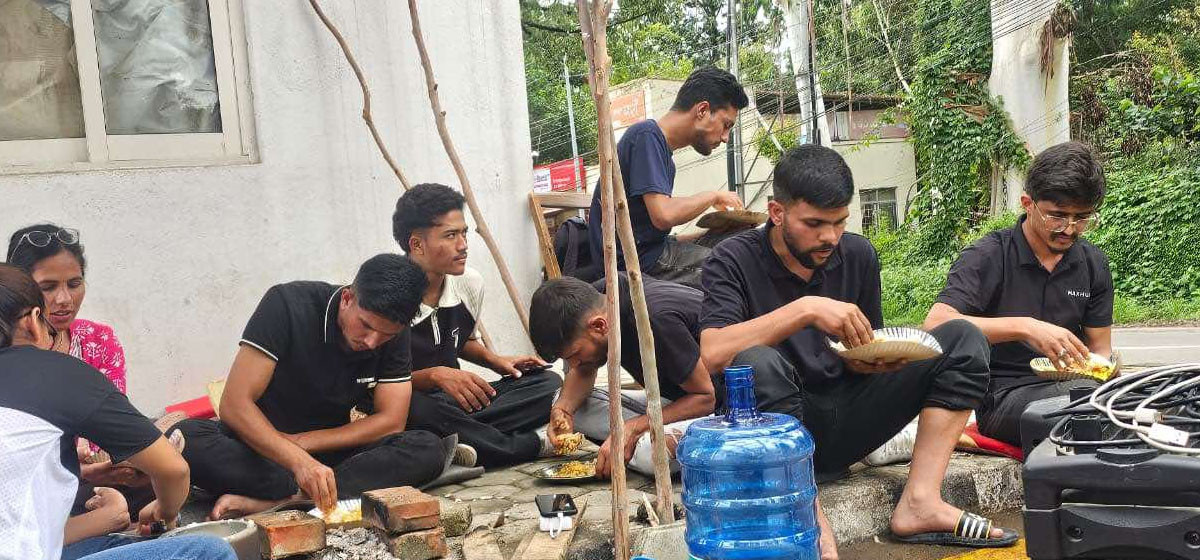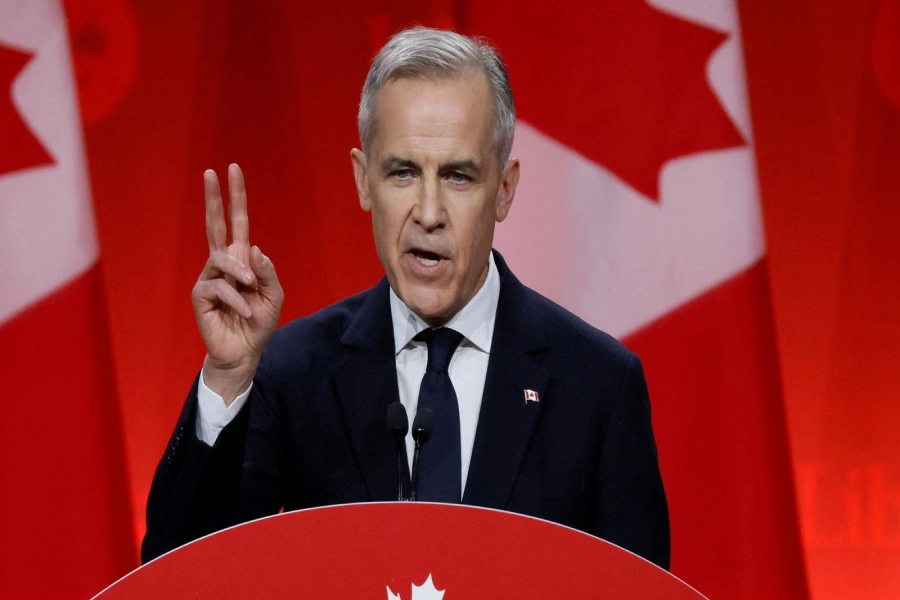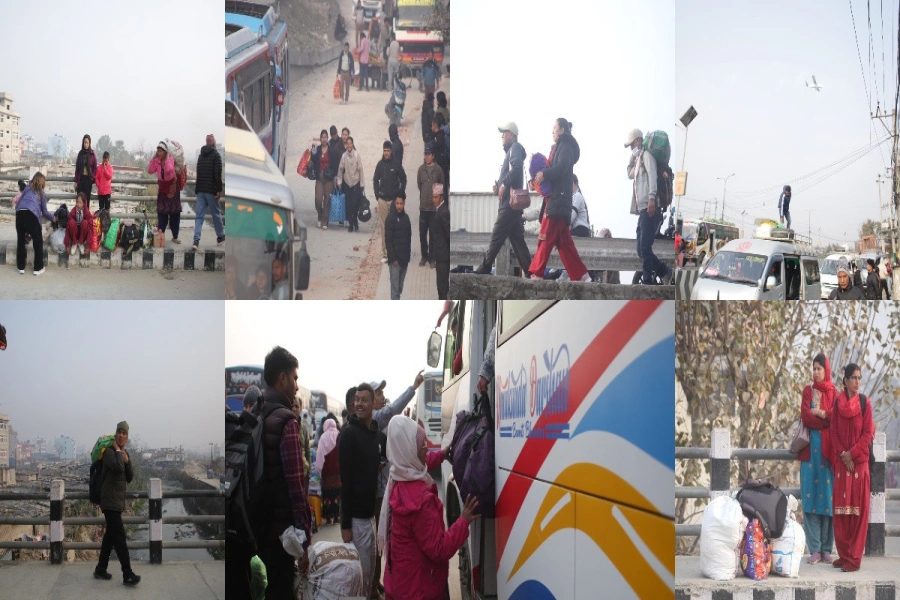KATHMANDU, Aug 14: Tribhuvan University (TU), which should be emerging as a strong center of learning, has increasingly witnessed new forms of student protests.
Recently, scenes of students cooking and eating at hunger strike sites within the university campus—even celebrating picnics—have made it feel as though TU has become a hub for protests rather than academic activities.
For the past 21 days, such activities by students from the CPN (Maoist Center)–affiliated All Nepal National Independent Students’ Union (Revolutionary) (ANNISU-R) have drawn widespread attention. These revolutionary students are protesting fee disputes in four departments.
The students, engaged in sit-ins, hunger strikes, and vandalism of offices, were participating on Wednesday morning in relay hunger strikes outside the Vice-Chancellor’s office gate, soaked in water with tents pitched.
Interestingly, they cooked and ate meals at the very site of their relay hunger strike. On Wednesday morning, they cooked ‘gundruk’ (fermented leafy greens) and rice, and news of this relay hunger strike even reached Vice-Chancellor Prof. Dr. Deepak Aryal.
Eight universities from Nepal, India and B’desh to compete in J...

Vice-Chancellor Aryal described the students’ behavior as a “festive spectacle.” According to the university’s professors, assaulting teachers and vandalizing offices is not proper student conduct; rather, it is the wrongful behavior of anarchic political party activists spreading fear within TU.
At the country’s largest and most prestigious university, which sees continuous visits from foreign students and scholars, the campus has effectively become a carnival of protests.
Vice-Chancellor Aryal expressed that the protests have prevented him from executing his planned work within the university. He mentioned that the protests and threats have lowered his morale and he has even sought security assistance from the home administration.
“The Vice-Chancellor cannot work effectively within the university. I feel embarrassed not being able to sit in discussions with foreign scholars in my office. Political parties must provide moral education to their activists,” Prof. Dr. Aryal lamented to Republica. “I served as Head of the Department in Hydrology and Meteorology for eight years, building it academically. I became Vice-Chancellor determined to use that expertise for the overall educational improvement of the university. But entrenched party politics within the university obstructs work. ANNISU-R students assaulted Registrar Prof. Dr. Kedar Prasad Rijal and vandalized the Vice-Chancellor’s office and the Rector office. This political anarchy lowers our morale. I will raise the question with Maoist Center Chairman Pushpa Kamal Dahal—why is your party producing activists who disrespect faculty? Are moral lessons not given within your party?”
Since the day after Prof. Dr. Aryal was appointed Vice-Chancellor on July 9, lockdowns, sit-ins, encirclements, hunger strikes, and vandalism within the university have continued, gradually demoralizing the university administration.
On the day following his appointment, engineering students protested for 10 consecutive days over non-payment issues. Vice-Chancellor Aryal personally led negotiations and resolved the problems through dialogue.
On July 20, ANNISU-R submitted a memorandum to Vice-Chancellor Aryal, demanding that the fees of four departments—Conflict Management, Social Work, Gender Studies, and International Relations—be equalized with other central departments.
From July 21 onwards, revolutionary students began encircling the Vice-Chancellor’s office, holding sit-ins and protests. Aryal reported that the protests occurred continuously, leaving him little room to work.
The revolutionary students’ protest, which began on July 20, continued until August 11, the 19th day, when clashes with police in front of the Vice-Chancellor’s office led to the arrest of some students, while others were removed from the office area. Currently, under the leadership of Pravin Dahal, ANNISU-R students continue a relay hunger strike outside the Vice-Chancellor’s gate.
TU had decided on September 17 and November 27 last year to convert programs that were previously private—Conflict Management, Social Work, Gender Studies, and International Relations—into central departments. However, the fees remain the same as for private programs. On one hand, TU revised its educational rules to adopt the school concept, while on the other, establishing private programs as central departments highlights inconsistencies in TU’s academic regulations.
ANNISU-R leader Pravin Dahal stated that the protests will continue until the fees of the four departments are aligned with other departments. “Currently, fees in other TU departments range from Rs 13,000 to 18,000 per semester. But the fee for our four departments remains Rs 36,000 per semester, and Rs 36,000 for admission,” Dahal said. “Our main demand is that when the programs are converted into departments, the fees should also align with other departments. Currently, we are soaked in water, cooking meals on stoves at the site of our relay hunger strike. Some damage to the Rector and Registrar’s offices has occurred. If fees are not reduced, we will escalate the protests.”
Vice-Chancellor Aryal argued that there is no rationale for reducing the fees since the fee was not increased. “The programs have been made central departments, but all four remain private programs. They run entirely on their fees,” he clarified. He added with frustration, “From the day I was appointed Vice-Chancellor, students and sometimes teachers have held protests, encirclements, and sit-ins. I have been working externally. Perhaps this is why former Vice-Chancellor Kesharjung Baral resigned within a year. It is very difficult for me to work under these circumstances. It is a challenge to advance TU in such an environment.”
Vice-Chancellor Aryal said that due to fear and insecurity within TU, he has requested security from the home administration. He added, “I have also sought security for the Rector and Registrar.”
He further stated that TU operates on 47% government grants and 53% internal resources, thus necessitating the collection of fees even from these four departments.







































